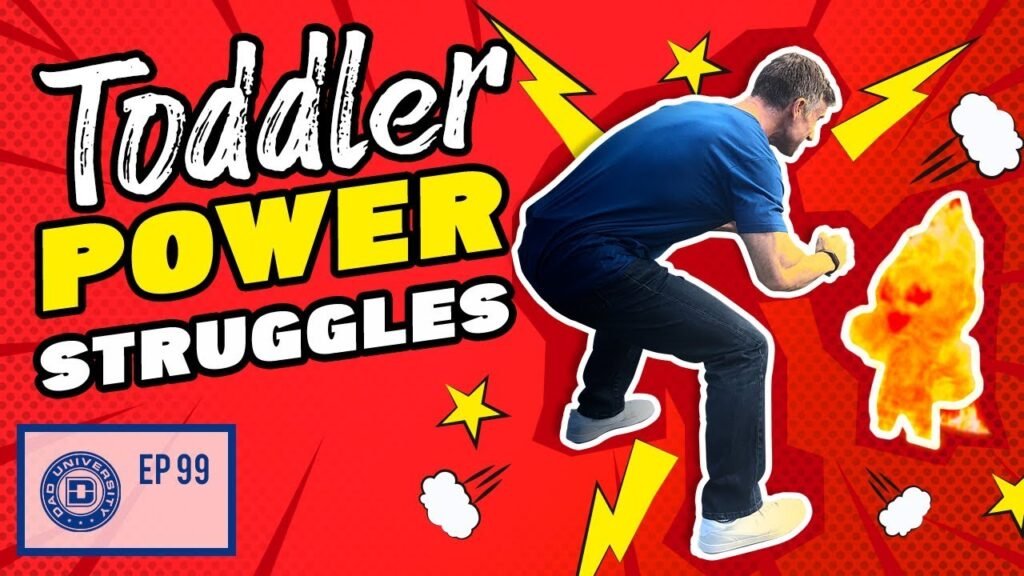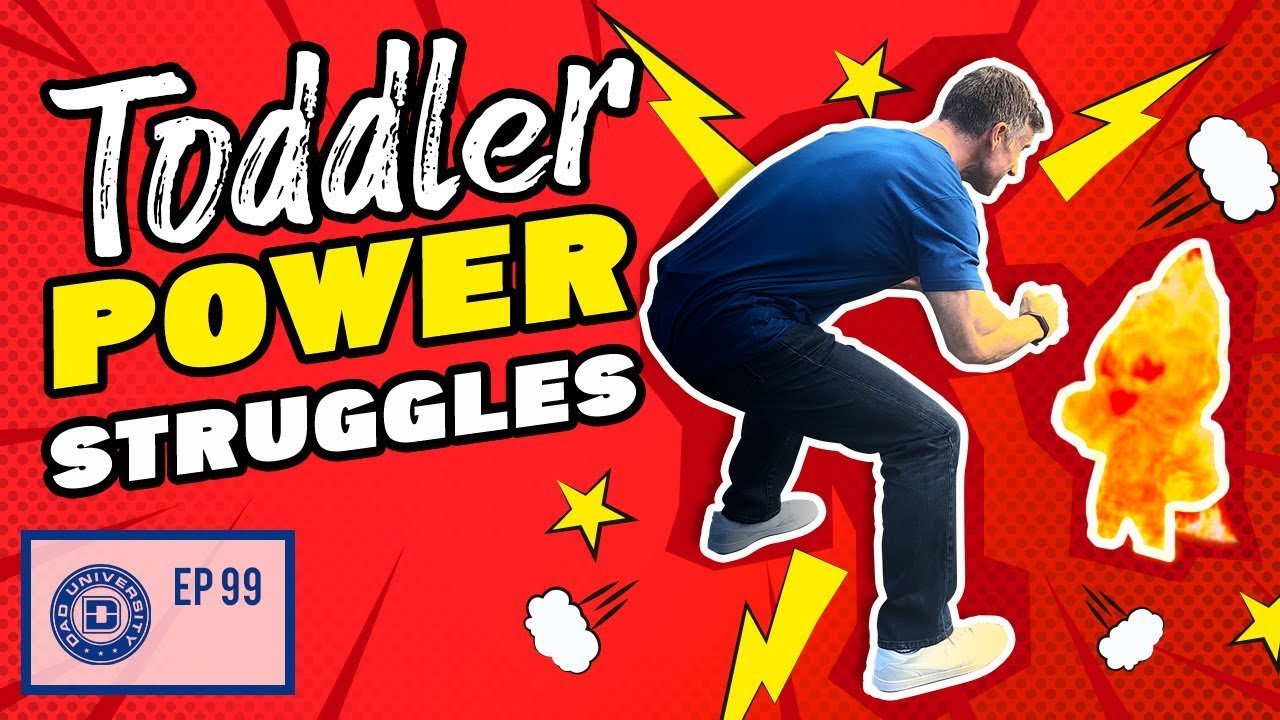If you’re a parent of a toddler, you are probably all too familiar with power struggles. Your two-year-old daughter doesn’t want to leave the park, so she throws herself down in protest. Or your three-year-old son doesn’t want to wear the shirt you picked out for him, so he runs around the room trying to avoid you. The struggle is real, and in this case, it’s a power struggle.
Hey guys, I’m Jason from Dad University, and welcome to another episode where we discuss the common reasons why we have power struggles with toddlers. Keep in mind, as your child gets older, power struggles may continue but in different forms based on their age. Power struggles are common in all kinds of personal relationships, especially when someone is trying to assert control or authority over another person.

Understanding Toddler Power Struggles
As a parent, you may have encountered power struggles with your toddler, and it can be both frustrating and taxing. It’s important to understand why these power struggles occur, the common emotions toddlers experience, and what normal behavior looks like in young children.
Reasons for Power Struggles
Power struggles with toddlers often stem from a desire for control. Your child may want to make their own decisions but lack the ability to effectively communicate. These struggles are not about defiance or intentionally causing trouble; they are simply trying to navigate a world full of new experiences.
Common Emotions in Toddlers
Toddlers experience a range of emotions during power struggles, including frustration, confusion, and overwhelm. They are still learning how to handle their own feelings and lack the vocabulary to express themselves clearly.
Normal Behavior in Toddlers
Testing boundaries and asserting independence are common behaviors in toddlers. They may push limits as they learn and grow, which can manifest as power struggles with parents or caregivers.
Tips to Avoid Power Struggles
Navigating power struggles can be challenging, but there are strategies you can implement to minimize conflicts and promote positive interactions with your child.
Don’t take it Personally
When your toddler engages in a power struggle, remember that they are not trying to upset you intentionally. Stay calm and try not to take their behavior personally.
Do not Reward Bad Behavior
Avoid reinforcing negative behavior by providing attention or giving in to demands during power struggles. Instead, encourage positive behavior by setting clear boundaries and expectations.
Pick Your Battles
Choose your battles wisely and prioritize important issues over minor disagreements. By allowing your child to have some control in non-critical situations, you can reduce power struggles.
Give Them Choices
Offer your child limited choices to help them feel more in control of the situation. This can empower them to make decisions and reduce the likelihood of a power struggle.
Be Empathetic
Practice empathy by putting yourself in your child’s shoes. Understanding their perspective and emotions can help you respond to power struggles with compassion and patience.
Reasons Behind Power Struggles
Understanding the underlying reasons for power struggles can help you address them more effectively and prevent conflicts before they escalate.
Desire for Control
Toddlers often engage in power struggles because they want to assert control over their environment. By providing them with opportunities to make choices, you can help satisfy this need for autonomy.
Inability to Communicate Effectively
Limited language skills can hinder a toddler’s ability to express their feelings and needs. Frustration from not being understood can lead to power struggles as they try to communicate in other ways.
Testing Boundaries
Testing limits is a normal part of development for young children. By pushing boundaries, toddlers are exploring their independence and discovering the consequences of their actions.
Common Emotions in Toddlers
During power struggles, toddlers may experience a range of emotions that can be overwhelming for them to handle. Recognizing these feelings can help you respond with empathy and understanding.
Frustration
Feeling frustrated is common for toddlers who struggle to communicate their needs effectively. Acknowledging their frustration and offering support can help diffuse tense situations.
Confusion
Young children may feel confused when faced with conflicting emotions or expectations. Providing clear guidance and reassurance can help alleviate their confusion.
Overwhelm
Power struggles can be overwhelming for toddlers, especially when they are unable to express themselves verbally. Creating a calm and supportive environment can help them feel more secure.
Positive Parenting Strategies
Implementing positive parenting strategies can help you navigate power struggles with your toddler in a constructive and nurturing way.
Modeling Calm Behavior
Children learn by observing their parents’ behavior. By remaining calm and composed during power struggles, you can demonstrate healthy ways to manage emotions and conflicts.
Setting Clear Expectations
Establishing clear and consistent expectations for behavior can help reduce power struggles. By outlining rules and consequences in advance, your child knows what is expected of them.
Offering Consistent Responses
Consistency in your responses to power struggles reinforces boundaries and helps your child understand the consequences of their actions. By following through with consequences, you establish a sense of predictability for your child.
Impact of Power Struggles on Parent-Child Relationship
Managing power struggles effectively can strengthen your relationship with your child and foster a sense of trust and connection.
Building Trust
By responding to power struggles with patience and understanding, you build trust with your child. Trust is the foundation of a healthy parent-child relationship and can help navigate challenging moments together.
Maintaining Connection
Staying connected with your child during power struggles can help them feel supported and secure. By empathizing with their emotions and remaining engaged, you can preserve the bond between you.
Fostering Independence
Encouraging independence in your child while setting appropriate boundaries can help them develop confidence and autonomy. By allowing them to make choices and learn from their mistakes, you empower them to grow and learn.
Practical Approaches to Handling Power Struggles
Utilizing practical strategies can help you manage power struggles effectively and reduce conflict in your interactions with your toddler.
Redirecting Attention
When faced with a power struggle, redirecting your child’s attention to a different activity or subject can help de-escalate the situation. Engaging them in a new task or offering a distraction can shift the focus away from the conflict.
Using Positive Reinforcement
Positive reinforcement involves rewarding desired behavior to encourage its repetition. Praising your child for making good choices or following instructions can reinforce positive behavior and reduce the likelihood of power struggles.
Establishing Routines
Creating predictable routines and schedules can help minimize power struggles by providing structure and stability for your child. Consistent routines can reduce anxiety and uncertainty, leading to smoother transitions and fewer conflicts.
Seeking Support as a Parent
Parenting can be challenging, especially when faced with power struggles and behavioral issues. Seeking support from other parents, educators, or professionals can provide guidance and reassurance during difficult times.
Engaging with Parenting Communities
Joining parenting communities or support groups can connect you with other caregivers who may be experiencing similar challenges. Sharing experiences, advice, and resources can offer valuable insights and encouragement.
Consulting Professionals for Guidance
If you feel overwhelmed or unsure how to handle power struggles with your toddler, don’t hesitate to seek guidance from professionals. Child psychologists, therapists, or pediatricians can provide expert advice and strategies to support you and your child.
Celebrating Small Victories
Recognizing and celebrating small victories along the way can help you stay motivated and positive as you navigate power struggles with your toddler.
Recognizing Progress
Acknowledging the progress your child makes, however small, can be rewarding and affirming. Celebrate achievements and milestones to build confidence and resilience in your child.
Acknowledging Efforts
Recognizing the efforts your child puts into managing their emotions and behaviors can encourage them to continue making positive choices. Praising their attempts and perseverance can boost their self-esteem and motivation.
Patience and Persistence
Parenting is a journey that requires patience and persistence. Power struggles may be challenging, but staying consistent and committed to positive parenting practices can lead to long-term success and growth for both you and your child.
Conclusion
Parenting toddlers can be demanding, especially when navigating power struggles and challenging behaviors. Embracing these challenges with patience and consistency can strengthen your relationship with your child and promote healthy development. Remember, you are not alone in this journey, and with empathy, support, and positive parenting strategies, you can overcome power struggles and foster a strong connection with your toddler. Stay patient, stay consistent, and remember that you are doing your best to support and guide your child through their early years.

